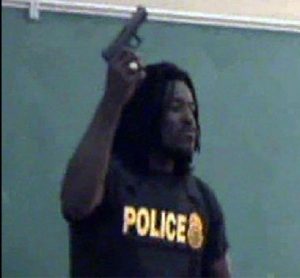The Drug Enforcement Administration (DEA) reportedly has one of the most challenging handgun qualification courses in the federal government. It mandates quarterly training firearms training and semiannual firearms qualification to ensure agents “maintain a high level of proficiency in the use and safety” of their weapons. So it would probably be a bit embarrassing if an agent shot himself while demonstrating gun safety to children.
That’s what happened to Lee Paige while making a drug education presentation to about 50 children and parents at a community center in Orlando, Fla., in April 2004. As he talked about the importance of gun safety, he displayed his handgun. “I am the only one in the room professional enough, that I know of, to carry this Glock 40,” he told the group. Almost immediately after, the gun discharged, wounding Paige in the leg. The incident was reported in the press but without identifying Paige.
Even though his wounds were self-inflicted, Paige sued the DEA.

Lee Paige displaying the handgun
A parent videotaped his presentation and turned the tape over to the DEA. During the DEA investigation, the tape was copied several times. Ultimately, Paige, a 14 year veteran of the DEA at the time of the incident, was suspended for five days. The videotape was returned to the parent but with the portion with the firearm removed. In March 2005, video of the incident began circulating on the Internet. It also was shown on several television shows, including the Jay Leno Show, CNN Headline News, Fox News, and the Jimmy Kimmel Show.
A year later, Paige sued the DEA. He said he’d become “the target of jokes, derision, ridicule and disparaging comments,” as well as “embarrassing and humiliating comments.” Paige claimed that because the DEA had exclusive custody of the portion of the video in which he shot himself, it was responsible for its disclosure.
Paige’s complaint was dismissed by the federal district court. The U.S. Court of Appeals agreed, although it said the DEA wasn’t blameless. The court said the DEA hadn’t invaded Paige’s privacy because the incident occurred in a public place and he knew a parent was using a video recorder. And while the DEA hadn’t violated the federal Privacy Act, the court said its actions demonstrated the need for federal agencies to safeguard video records “with extreme diligence” in the internet age. “The DEA’s treatment of the video-recording – particularly the creation of so many different versions and copies – undoubtedly increased the likelihood of disclosure and, although [it didn’t violate the law], is far from a model of agency treatment of private data,” it said.
Paige certainly wasn’t the only law enforcement who drew unflattering attention by accidentally shooting themselves in public. But you have to wonder if filing a lawsuit long after the fact minimizes your notoriety.
Speaking personally, you can have my gun, but you’ll take my book when you pry my cold, dead fingers off of the binding.
Stephen King, TIME, June 19, 2000







